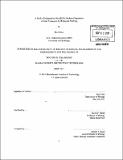A study of mammalian microRNA-mediated repression of gene expression by ribosome profiling
Author(s)
Guo, Huili
DownloadFull printable version (17.95Mb)
Other Contributors
Massachusetts Institute of Technology. Dept. of Biology.
Advisor
David P. Bartel.
Terms of use
Metadata
Show full item recordAbstract
All cells in a multicellular organism carry the same genes, yet these same genes direct the differentiation of many different cell types. This is facilitated by differential gene expression, the control of which can be exerted at the transcriptional, as well as post-transcriptional, level. MicroRNAs (miRNAs) are -22- nucleotide small RNAs that mediate post-transcriptional regulation of gene expression by base pairing to their target mRNAs to direct repression. In animals, this repression is usually mediated through translational repression and/or mRNA destabilization. In studies that investigate miRNA-mediated repression with reporter constructs or individual endogenous genes, translational repression and mRNA destabilization have been observed to contribute variably to the overall level of repression. This led to the question of whether the same was true for endogenous targets at a genome-wide level. While changes in mRNA levels can be easily captured by microarray measurements, it is harder to measure translational repression on a genome-wide scale. To address this gap, we used ribosome profiling to measure effects on protein production and compared these to simultaneously measured effects on mRNA levels. The latter were also quantified by a deep-sequencing approach (mRNA-Seq). This enabled us to obtain a snapshot of changes in translational efficiency at the genome-wide level. For both ectopic and endogenous miRNA regulatory interactions, we observed that lowered mRNA levels account for most (>84%) of the decreased protein production. These results show that changes in mRNA levels closely reflect the impact of miRNAs on gene expression and indicate that destabilization of target mRNAs is the predominant reason for reduced protein output. The slight reduction in translational efficiency is likely mediated by an inhibition of translation initiation. For studying miRNA repression in an endogenous system, we had initially used in vitro differentiated neutrophils from mir-223 knockout mice and compared these to cells from wild-type mice. Because neutrophils have a shorter lifespan than most differentiated cell types, we selected another endogenous system, antigen-stimulated B cells from mir-155 knockout mice, and similarly compared these to cells from wild-type mice. In addition to mRNA-Seq and ribosome profiling, we made parallel proteomics measurements. Our results show that miR- 155 in antigen-stimulated B cells primarily mediates mRNAlevel changes, though the contribution from changes in translational efficiency was larger than previously observed. In addition, we observed widespread translation of upstream open reading frames initiated from canonical and non-canonical start codons. These upstream open reading frames are also translationally repressed by miR-155.
Description
Thesis (Ph. D.)--Massachusetts Institute of Technology, Dept. of Biology, 2011. Cataloged from PDF version of thesis. Vita. Includes bibliographical references.
Date issued
2011Department
Massachusetts Institute of Technology. Department of BiologyPublisher
Massachusetts Institute of Technology
Keywords
Biology.